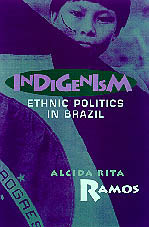The University of Wisconsin Press
Anthropology / Latin American Studies
Indigenism “A gem.
The chapters work together beautifully to build up a sophisticated
understanding of indigenism in Brazil. . . . Ramos provides vivid
detail and anecdote, but also writes in a way that links the
‘indigenous culture wars’ of Brazil in the 1980s and 1990s to
battles over citizenship and cultural difference in many parts
of the world.” Indigenous people comprise only 0.2% of Brazil’s population, yet occupy a prominent role in the nation’s consciousness. In her important and passionate new book, anthropologist Alcida Ramos explains this irony, exploring Indian and non-Indian attitudes about interethnic relations. Ramos contends that imagery about indigenous people reflects an ambivalence Brazil has about itself as a nation, for Indians reveal Brazilians’ contradiction between their pride in ethnic pluralism and desire for national homogeneity. Based on her more than thirty years of fieldwork and activism on behalf of the Yanomami Indians, Ramos explains the complex ideology called indigenism. She evaluates its meaning through the relations of Brazilian Indians with religious and lay institutions, non-governmental organizations, official agencies such as the National Indian Foundation as well as the very discipline of anthropology. Ramos not only examines the imagery created by Brazilians of European descent—members of the Catholic church, government officials, the army and the state agency for Indian affairs—she also scrutinizes Indians’ own self portrayals used in defending their ethnic rights against the Brazilian state. Ramos’ thoughtful
and complete analysis of the relation between indigenous people
of Brazil and the state will be of great interest to lawmakers
and political theorists, environmental and civil rights activists,
developmental specialists and policymakers, and those concerned
with human rights in Latin America. |
|
|||||||
|
|
If you have trouble accessing any page in this web site,
contact our Web manager. Updated 9/24/2014 © 2010, The Board of Regents of the University of Wisconsin System |
